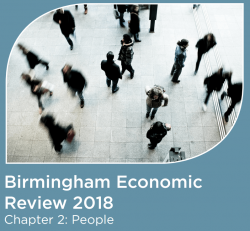Dr Abigail Taylor provides an economic snapshot of the Black Country LEP area following the five foundations of the Industrial Strategy: Ideas, People, Infrastructure, Business Environment and Place. As part of the Midlands Engine Economic Observatory work, WM REDI and the Black Country Consortium Economic Intelligence Unit developed Local Economic Partnership (LEP) level profiles. We … Continue reading “The Black Country LEP Area – A Profile”
Tag: Skills gap
Perspectives on Skills and the Value of Training: Trends, Challenges and Priorities
In this blog, Professor Anne Green and Dr Abigail Taylor discuss their new report “Workplace Perspectives on Skills” examining employer perceptions relating to skills and the value of training, with the aim of understanding the specific skills and skills investment challenges employers face. Previous research for the Industrial Strategy Council highlighted that by 2030, 7 … Continue reading “Perspectives on Skills and the Value of Training: Trends, Challenges and Priorities”
Changing Perceptions of Birmingham
This blog post has been produced to provide insight into the findings of the Birmingham Economic Review. The Birmingham Economic Review 2019 is produced by City-REDI, University of Birmingham and the Greater Birmingham Chambers of Commerce, with contributions from the West Midlands Growth Company. It is an in-depth exploration of the economy of England’s second … Continue reading “Changing Perceptions of Birmingham”
Making Inclusive Economic Growth Happen
This blog post has been produced to provide insight into the findings of the Birmingham Economic Review. The Birmingham Economic Review 2019 is produced by City-REDI, University of Birmingham and the Greater Birmingham Chambers of Commerce, with contributions from the West Midlands Growth Company. It is an in-depth exploration of the economy of England’s second … Continue reading “Making Inclusive Economic Growth Happen”
Understanding Productivity and Prosperity: Regional Skills Mismatches and Inclusive Growth for the West Midlands
Chloe Billing reflects on this year’s Regional Studies Association’s annual conference in Santiago de Compostela. On the 6th June, I had the opportunity to present the findings from the first phase of City REDI’s project on ‘Productivity and Prosperity’ at the RSA conference in Santiago. Details of the ESRC funded project and the wider team … Continue reading “Understanding Productivity and Prosperity: Regional Skills Mismatches and Inclusive Growth for the West Midlands”
New Policy Institute: The State of Economic Justice in Birmingham and the Black Country
NPI’s recent report on behalf of the Barrow Cadbury Trust depicts a shocking, if not surprising, picture of economic injustice in England’s second city and the surrounding Black Country. The report combines the traditional economic barometers like productivity with the ideas of social justice and how the economy spreads well-being. The first of its kind … Continue reading “New Policy Institute: The State of Economic Justice in Birmingham and the Black Country”
The Birmingham Economic Review 2018: People – Inclusive Growth and Skills
This blog post has been produced to provide insight into the findings of the Birmingham Economic Review. The Birmingham Economic Review 2018 is produced by City-REDI, University of Birmingham and the Greater Birmingham Chambers of Commerce, with contributions from the West Midlands Growth Company. It is an in-depth exploration of the economy of England’s second … Continue reading “The Birmingham Economic Review 2018: People – Inclusive Growth and Skills”
Mind the Gap! Qualification Shortages in the West Midlands
Given that the negotiations leading to the United Kingdom’s withdrawal are far from reaching a final consensus, the potential implications of any Brexit deal for bilateral skilled migration between the UK and the EU have attracted a great deal of attention by academics. Recent research has shown that almost one million EU citizens who work … Continue reading “Mind the Gap! Qualification Shortages in the West Midlands”







